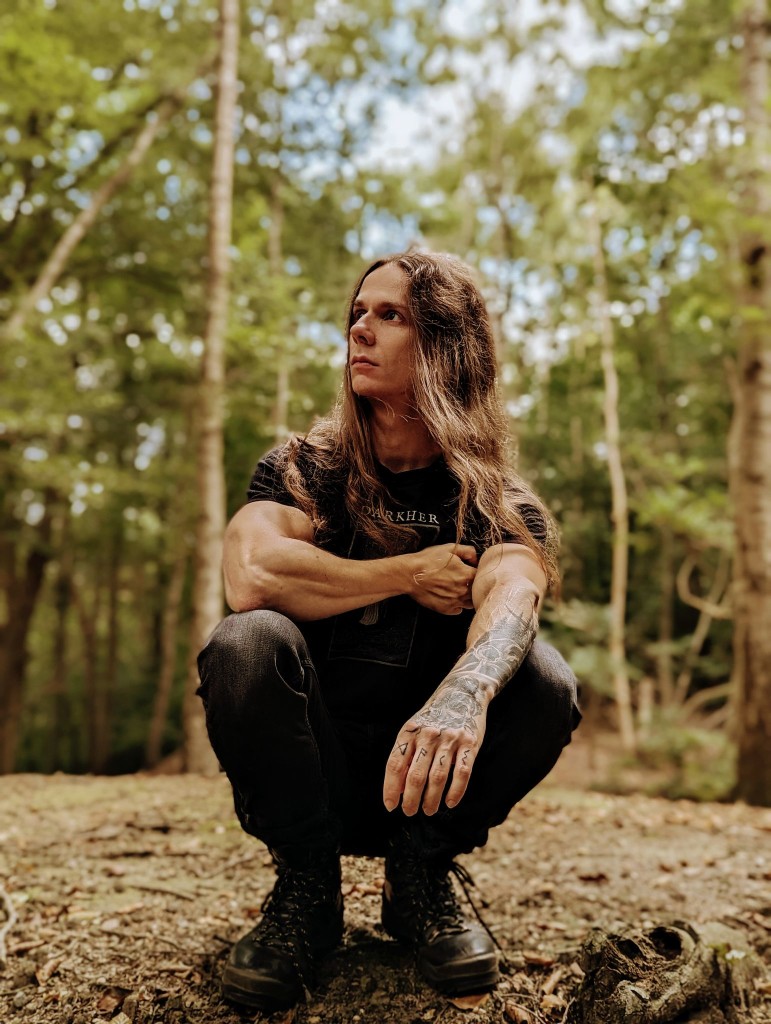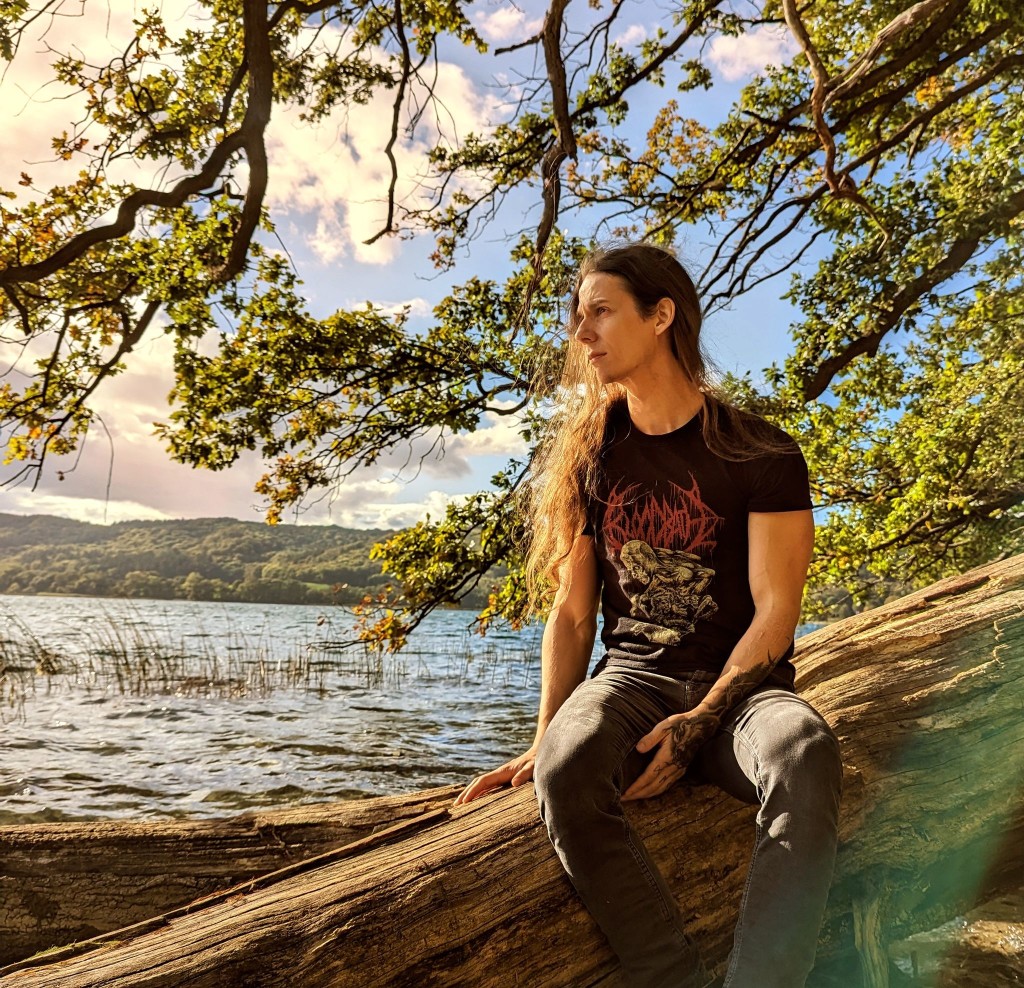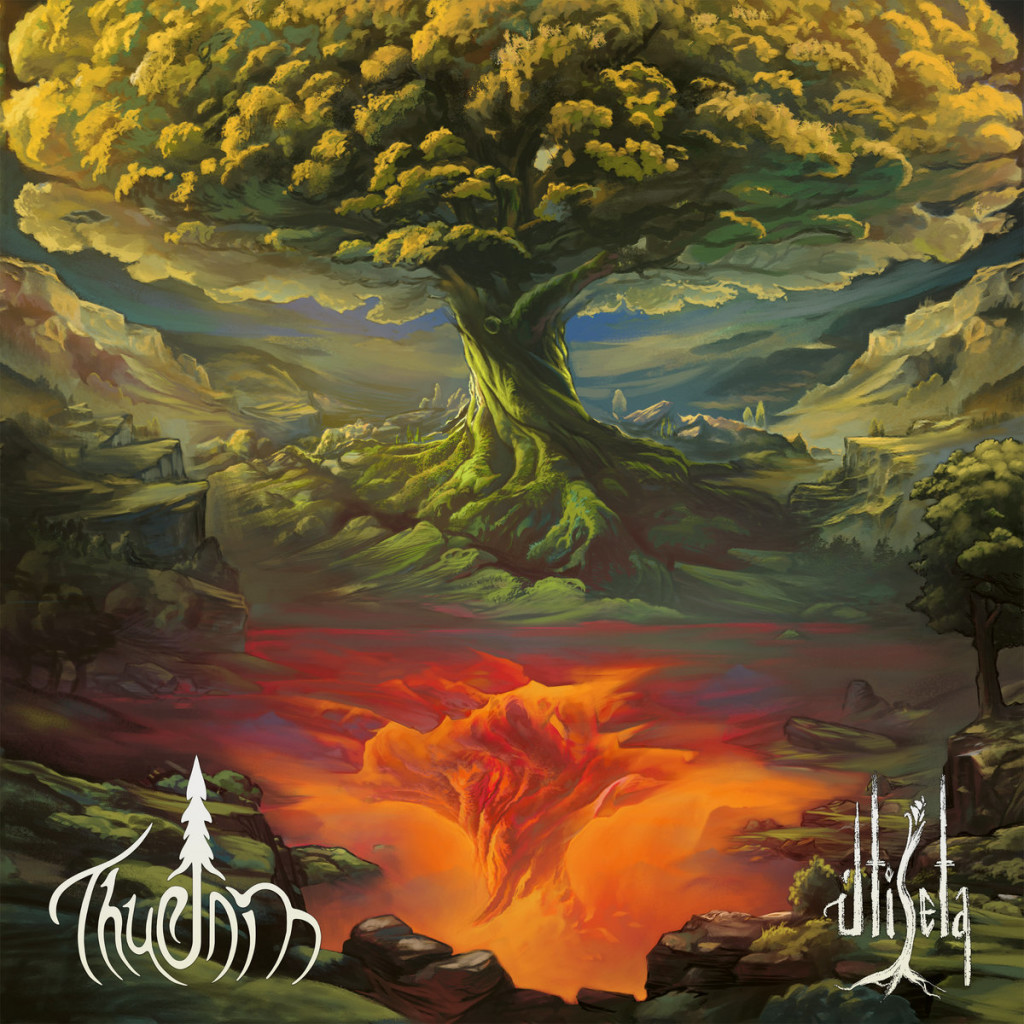For me, Thurnin’s new record, Utiseta, is easily one of the best albums of the year. Coming as a recommendation, Thurnin’s sophomore album blindsided me with its incredibly astute songwriting, rich instrumentation, and resonant Pagan aesthetics. Given my obsession with this LP since its release in September, it seemed only logical I get some discourse going with Jurre Timmer – the project’s mastermind – to discuss the thought processes behind the project, his sudden success with Thurnin’s debut LP Menhir back in 2021, and how he approached moving forward with a successor.
Give us a bit of background on yourself.
Jurre: I started doing mostly metal back in 2015, which was when I was really getting into songwriting. I released two albums under a previous project [Algos], but I drifted away from that because it’s a really expensive and difficult genre to produce in if you’re doing everything solo. So after that I shifted my attention and made a doom album under the moniker I, Forlorn, but then all my equipment broke, so I decided to go back to what I had originally started doing, which was acoustic music. I wrote this demo which ended up being “A Lament for the End” – which was the only song on Menhir that was completely improvised – and showed it around to some friends, who encouraged me to go down this path and make more of it. So I set out to make this really chill album without any stress or expectations, but in an ironic turn it ended up getting over a million views. Which is funny, because Menhir was meant to be the opposite of that; it was just meant to be this relaxing album I made for fun, but it ended up getting all this attention.
You’re obviously well into your metal. I find it really interesting, because a lot of people I know and people I’ve interviewed in the past, they come from metal backgrounds, but they end up falling into this folk genre. What’s your appeal with folk music?
Jurre: I’m getting too old (laughs), and that’s a big statement because I’m 33, so I’m not old by any stretch of the imagination. I still like doing metal, but it’s just so much work. It’s not like I don’t want to do the work, but with how difficult it is to sustain a career or to get any financial gain out of music, to do a metal album now, it’s going to take four times as long, fulfil me less, and have much less broad appeal. For me, it’s mostly about the cost and writing stuff for my own pleasure, and while I still enjoy writing metal stuff, I can also make this cool thing that doesn’t sound like anything else – instead of writing the fiftieth Gothenburg-sounding death metal album to come out this week. Playing music is an accumulation of things, but mostly it’s because I like playing acoustic more than metal. My left hand is not great for picking, because I poorly play upside down. I’m technically not even a lefty – I don’t know how I ended up playing guitar this way, but it means that because I don’t do the micro movements – from writing and every day stuff that you get with your dominant hand– it means fast picking is not very natural for me. So if I’m going to play super technical metal, I feel like it hinders me a lot and just ends up frustrating me, whereas fingerstyle picking is fine. One of the positives from choosing the latter is that it pushes me to do the thing I’m better at and feel more comfortable with.
What artists inspire you?
Jurre: It started with bands like Vali and Musk Ox –
Oh, you’re a big fan of Musk Ox?
Jurre: Oh yeah. Woodfall was on my playlist for so long, and that was actually one of the albums I kept going back to when I was writing, as reference to remind myself you can do more with less. Having Nathaniel [Larochette] over recently for a tour I did was amazing, because he’s The Guy – he’s one of the guys that got me into this, and then you meet him and he’s just one of those people where you meet and feel like you’re instantly friends, and it’s great.
What was the overall goal for Menhir?
Jurre: I guess for me it was to just unwind. The album I did for the I, Forlorn project was deeply personal to me – it’s me dealing with some deeply traumatic events. So, Thurnin is the aftermath of that; going through all of this stuff and then trying to move forward and find peace again. That was the only goal for me. It’s not an original answer, because I think every artist goes through this, where I don’t want to do it but I feel this drive because it’s the one thing I know I’m adequate at. And so, I had this urge to create something. I didn’t know what, but the Menhir sound just felt like the logical step forward for me.
Music is very therapeutic as well, so it bodes well if you make something from traumatic events. I think folk is the right style of music to help you muse and ponder over things, isn’t it?
Jurre: Yeah. Whenever I see messages or comments from people saying “This got me through some tough times” it’s like, okay great. That’s exactly what it was made for.
Menhir was a big success, so what was your approach for Utiseta?
Jurre: It’s the dreaded second album where you’re always like “I have to one up myself,” so I had that in my mind, for better or worse. But everyone has said it’s for the better, because it’s this whole unique experience. One thing that was on my mind constantly – and I don’t remember the commenter’s name, and if this person ever reads or hears this, he will be like “Oh yes, I had an impact on this” – but there was a comment on Menhir that basically said every song has the same emotion. And that made me think “I’ll show you” (laughs). I found the comment really funny, but I thought, I’m going to keep it in mind, and then when Utiseta comes out and someone says it again… it’s just like, you can’t please everyone. But generally, the aim was to do better than the first album. I was also fully aware that, especially on YouTube, getting those viewing numbers wasn’t going to happen again. It’s just a lot of luck and statistics. So I went into this album with just the intention of creating a better record.
For me personally, I heard your sophomore album first and then went back to Menhir, which is a decent album, but it just feels like hidden potential that ends up flourishing on Utiseta, that’s the best way I can describe it. Would you agree with that?
Jurre: Yeah, and it also comes with the territory that I can’t do the same album twice. I don’t want to, and if, hypothetically, someone was to say “do a Menhir 2.0” I wouldn’t know what that looks like. I have to constantly move forward, with fresh Ideas.
Utiseta has only just come out, but for your third album you’ll go in a different direction again?
Jurre: I think so. I have eight songs started and they feel like they’re in between the first two albums so far. But it’s hard to say right now, because it’s just a lot of chords and some melodies at the minute. I think it’s going to go in a bit of a darker direction, because that’s just the mood, and I feel like I might interchange between complexity and relaxation, maybe. The thing I like about Utiseta the most compared to Menhir was that every song had this build up and climax, whereas Menhir was more like a static line. And I feel like I’ve got to focus on that in the future.
One of the main draws for me on Utiseta is you have this incredible knack for building a song and then putting in these moreish earworm melodies that just build and build.
Jurre: Sometimes I would show demos to people and they would message me a few days later like, “I still have this fucking riff in my head”, and I’m just thinking “Yes! That’s perfect.”
They really do. Since Utiseta came out, I’ve constantly got it on. Even at work, people come in and they’re like, “What is this?” and I’ll just say “It’s like European folk music” and they’ll say how much they like it.
Jurre: That’s awesome. I got my first tattoo earlier this year and the artist asked me what I do, so I said I’m working on this folk project. So then he put Menhir on in the tattoo shop and then this other artist comes in like “Oh my God, what’s this?” So now every time I go in, I’ll bring in a CD for an artist or something and they’re so excited. It’s really cool to see other people I don’t know being enthusiastic about any of this.
Yeah, you’re really on to something. Listening to Nathaniel’s album [Old Growth] in July, that’s a great album and it’s in contrast to yours, where that’s purposefully minimalist and yours is really sort of grand. When it came to the writing process, did you hire people to do certain things or was everything written, composed and arranged by you?
Jurre: Everything except one bit of flute was written by me, but all of the flutes were played by a Canadian flutist called Dominique [BerDen]. She’s amazing… and then I accidentally misspelt her name in the album’s booklet, I’m sorry!
Did she do the vocal chanting as well?
Jurre: No, that’s Linnea [Lindqvist], who I met through Can Bardd, which is a Swiss black metal band. I contacted him [Malo Civelli] because I liked her vocals on his album. She did “The Seeress” and basically, I let her have full control and she wrote every vocal melody in that song, because I trusted her and she’s clearly very good at what she does. And I think there’s a flute solo in “Halcyon” that Dominique wrote. I did try and write most of the flutes but I let her make mild variations to add her own spin on things. I also ended up doing vocals, because I got pushed into it. I tried really hard, but it’s so hard to get past thinking, “You know what this song needs? My voice.”
The whole album feels like a dream. It’s very gauzy and dreamlike. When it came to the production, which I think is really stand out – I think it’s one of the highlights of the album – what was the recording process like, and did you have a good idea of how you wanted it to sound and feel?
Jurre: Menhir sounded a bit muddy and minimalistic, and it was actually recorded with a USB mic, which took a lot of work to get sounding right. This time around, I invested in a whole new setup, and I basically wanted it to have more clarity and be heavier, so we used various mics for different things that would contrast naturally in the mix. The investment into better sounding instruments and equipment, things like the cello made the sound more bassy, so there’s better highs and lows at the same time, which makes the whole album sound fuller. It came together quite naturally, just because of the higher quality recordings. It’s funny, I actually sprained my fretting hand thumb during the recording of Utiseta, but despite that, I recorded the whole thing in a week. It was a weird album to record and mix because I was in all this pain, but I had to get this out there. The whole experience was an interesting process. Nimblkorg Virtanen nailed the mix on this. He’s excellent at his job.
Was the approach to have a gauzy, dreamlike quality?
Jurre: Yeah, it was. The little harmonics in the middle of “Remembrance”, which sound like shooting stars, that was Nimblkorg’s idea, and the backwards riff effect in the intro of that song, all these small ideas came up to help give the album its dreamlike quality. But both myself and Nimblkorg have very gauzy ideas anyway, so that contributed to the record but also made working with Nimblkorg a very pleasant experience.
Utiseta feels like a place lost in antiquity, deeply rooted in Pagan history. It feels like you have a lot of reverence for European – and particularly Norse – history which seeps out of the music on here. Is this the case?
Jurre: I’ve been getting more into that. I mean, I have runes on my fingers – which is just my cat’s name – but I’ve always really liked it. I’ve been getting more into bands like Wardruna and Heilung, just because I really like the vibe. Norse mythology and everything around it is really interesting, however I don’t think I’m going to embrace that route to the point where I am known as “the Pagan guy.” I just like bits of it.
Right. So it’s like you said before; album three probably won’t have this Pagan vibe to it?
Jurre: I think I’m going to try and experiment in a different direction again, and have some weird instruments. If I could, I would definitely add hurdy-gurdy and stuff like that, because it sounds really cool. I want to do more things that I haven’t heard before.
A little cliché to say because Tolkien’s legendarium is synonymous with European/Norse mythology, but I get so many Tolkien vibes from this album, from the artwork and the music itself. Are you a fan of Tolkien’s work and does his work inspire you?
Jurre: Um, that’s a good one. I don’t think so, but I mean it’s hard to deny how good that soundtrack is [for the movies]. My main inspirations for writing come from game scores, stuff like Chrono Trigger, Legend of Zelda, and Final Fantasy. The Lord of Rings is, of course, an extension of that, but it’s a bit more bombastic. Even with games nowadays, like Dark Souls and Elden Ring, I love them and I love the soundtracks, but I can’t do anything with them musically, because it’s so completely different and over the top and has a different effect. But then you hear the music for The Shire where it’s like, if you’ve seen the movies, you will remember that song because it’s so specific. So I think in a way, songs like that help me pick up on the stuff I want to hear, while remaining minimalistic and not having a 100-piece orchestra type vibe to it.
Who does your artwork, because it’s absolutely stunning?
Jurre: Jack Bailey. We met through Counter-strike over 10 years ago. We were playing some ranked Counter-strike and ended up being on the same team and I thought he had a funny voice and that’s how we ended up being friends (laughs). We became friends from that and I found out he did art, so I said we should work together. He’s landed a big job doing art full-time now as well, so good on him, he deserves it. He’s always been good to work with, because I gave him this absolutely horrendous sketch for Utiseta, which was a picture of a sun smiling and “Light go here, dark go there”, and then after a few months, he sent me the artwork, saying “How about this?” and I was just like “Wow.”
Does he listen to the music before he draws anything?
Jurre: For Menhir, I gave him some demos and for Utiseta I sent him a song, I can’t remember which. But Jack just knows the vibe. He told me he was very nitpicky about the final piece because he doesn’t do commission work anymore and he just wants this to be his best piece. There was a lot of back and forth with him being like, “Hey, I’m done,” and then 10 minutes later he’d come back saying “Never mind” (laughs). It’s very relatable.
Do you think you’ll use him for the rest of your career?
Jurre: I don’t know. That’s not because I don’t love his art, it’s because he’s so busy and Utiseta took him a long time to make. And that’s not me trying to taint his character, because he’s great to work with. I just don’t want to put that on him; if I have deadlines especially, I don’t want to have to push him to get it done when he has other commitments. If it was up to me, yeah, I would love his art again, but also, there’s other artists out there with the same dreamy vibe, which I can try out.
What’s next for you?
Jurre: I’ve got a few things going. I’ve started working on something I don’t think I can talk about yet, but it’s a collaboration with an artist I really love, so that’s always cool. And like I said earlier, I’ve been writing a lot for a new album already. Also, last year while writing Utiseta, I was making a game soundtrack for a browser-based table top RPG. Since then, I’ve got a taste to do more of it. The problem is it’s a really hard business to get into. I can’t just message a developer and say “Hey, do you need some weird acoustic folk?”
What about gigs?
Jurre: I have one gig coming up that I also can’t talk about, but we’re trying to see if we can get more on that tour specifically. It’s hard to get gigs. I have no contacts in this country or in the genre, and the contacts I do have are mostly people who sit at home and record. We’re going to try and fly Nathaniel back over again at some point and get a proper tour going for at least the part of Europe that we have access to.
Anything to add?
Jurre: I’ve just been working on more stuff and slowly but surely, I’m coming to terms with my place in music. It’s a weird spot to be in, to suddenly be named with artists like Vali and Musk Ox, so I’m trying not to let that go to waste; by working on things and not taking three years to make a new record.
When do you think you’ll have a follow-up album made?
Jurre: That’s a good one. If I keep writing at this pace, I can do an album every year-and-a-half or two years. I think there will be a decent pace if budget and time permits, of course, because you know, life just happens sometimes.
Well, I already alluded to it earlier in the interview and you’ve said it as well; you’re definitely onto something. I’m not trying to embarrass you or anything but Utiseta is genuinely a really good album. I think, you’re definitely opening the right doors and getting the right heads turning, so just keep doing what you doing.
Jurre: Thank you.
Utiseta is out now and can be streamed on all major platforms. You can also purchase merchandise and the album itself on Thurnin’s website or bandcamp page.
Follow Thurnin on Facebook and Instagram.








11.04.23
11.04.23
11.04.23
11.05.23
11.06.23
11.06.23
11.07.23
11.07.23
11.08.23
11.08.23